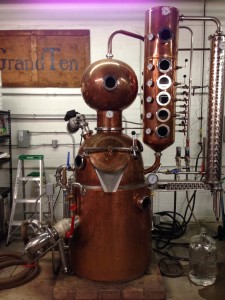 By: Thomas Siebertz
By: Thomas Siebertz
Simply put, this stuff is amazing! I recently got to take a tour of the Grand Ten Distillery and learn about the distilling process. Spencer, the owner, showed me around and afterwards I tasted some of the spirits they produce. Among them were American Gin, Fire Vodka, Irish Whiskey and Barrel Aged Gin. My favorite was the chocolate flavored version of the spicy Fire Vodka, Fire Puncher Black. The vodka is named for the legend of Tommy Maguire, who reportedly fought flames with this bare fists when a fire broke out in South Boston in 1887!
How are spirits made?
It begins with fermenting grain, fruit or vegetables. Fermentation is the process by which yeast cells consume sugar to produce ethanol and carbon dioxide. This liquid is then heated and the vapors are condensed to purify the alcohol. This happens many times in a still until the spirit is produced. Unsweetened, distilled alcoholic beverages that have an alcohol content of at least 20% ABV (alcohol by volume) are called spirits. This is some of the cool stuff you get to learn when you study food science!
How are beer and wine different from spirits?
Wine and beer are also both fermented alcoholic beverages, but do not undergo a distilling process like spirits do. Beer is made with water, hops and malted barley or wheat and can have herbs or fruit added for flavor. The fermentation process of beer causes carbon dioxide to be produced which is why beer has bubbles. Beer typically has an ABV of 4-6%.
Wine is made from fermented grapes or other fruits. Different varieties of grapes and strains of yeast produce different style of wine. The natural chemical balance of grapes lets them ferment without the addition of sugars. Yeast cells consume the sugars in the grapes and converts them into alcohol and carbon dioxide. Wine typically has an ABV of 9-16%.






Leave a Reply